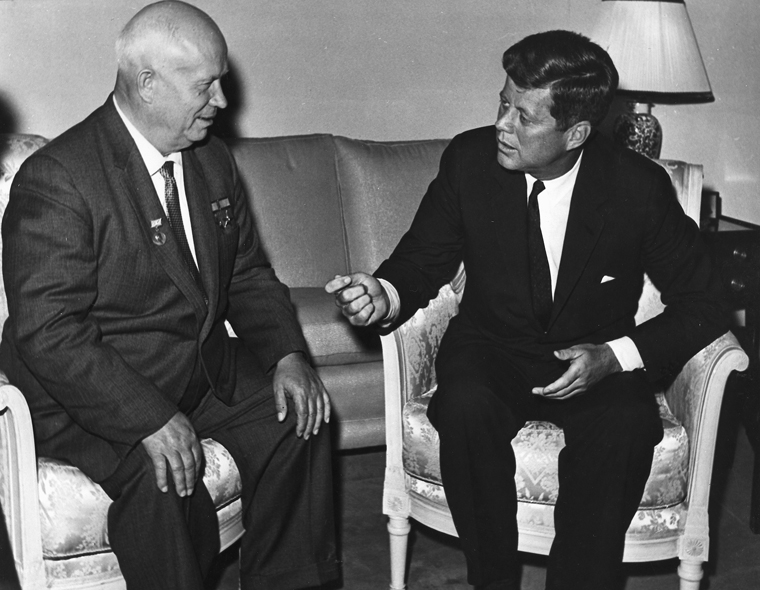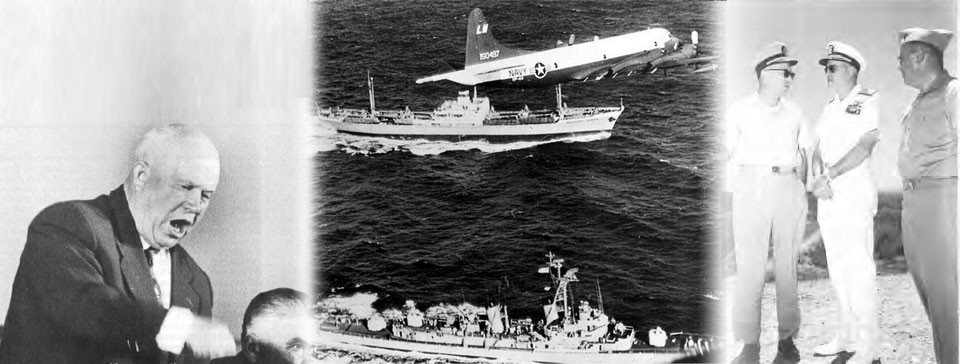Diplomacy, Restraint, and Luck: How Kennedy and Khrushchev Avoided Nuclear Disaster
Today marks the 54th anniversary of the most dangerous day of the Cuban Missile Crisis. The second to last day of the Crisis, infamously nicknamed “Black Saturday,” brought a combination of reasonable and steadfast decision making, and plain dumb luck, allowing Russia and the U.S. to successfully navigate away from a “hot” conclusion.
In the days leading up to Black Saturday, President John F. Kennedy and the Soviet Leader Nikita Khrushchev remained in a standoff — nuclear missiles hadn’t budged from Cuba and the two powers were face-to-face in a naval quarantine in the Caribbean Sea. Kennedy and ExComm, his committee of political and military leaders, were beginning to seriously contemplate an invasion to gain control of the missiles. American players knew this ultimately risked nuclear war.

On October 26, President Kennedy received a message from Khrushchev that said the missiles would be removed from Cuba if the U.S. promised not to invade the island. Through the evening and early morning hours, Kennedy and his team drafted a response, agreeing to those terms.
But before Kennedy’s reply could be sent, several events occurred, all of which could have easily incited the devastating launch of nuclear weapons.
Early in the morning of Black Saturday, Kennedy received a second letter from Khrushchev with an additional request: the U.S. must also remove American nuclear missiles in Turkey. Kennedy now had more to consider. Also that morning, a U.S. reconnaissance plane was shot down over Cuba, killing the pilot Major Rudolf Anderson Jr. The only military casualty of the crisis intensified the bargaining game. How was Kennedy supposed to interpret this act of escalation?
Later that afternoon, a U.S. spy plane accidentally flew off course for ninety minutes inside Russia’s easternmost airspace. Concerned by their unauthorized presence, Russia deployed fighters to shoot down the plane. The U.S. also sent fighters to find the lost plane and safely escort it safely home, only our fighters were nuclear-armed. Luckily, the Russians never found the plane.
As if that wasn’t enough, tension was also spilling over into the Caribbean Sea. The U.S. Navy dropped a slew of “signaling depth charges” as part of the quarantine procedure, attempting to request that a Russian submarine below rise to the surface.
What the U.S. Navy didn’t know was this particular submarine was carrying a nuclear torpedo with orders to fire should their hull be breached by depth charges, assuming such charges indicated a nuclear strike had occurred. The submarine, having no information as to the situation above water and no means of communication with Moscow, had to consider launching their torpedo. In order to strike, the launch required three officers to agree. Luckily, one of the Russian officers, Vasili Arkhipov, refused to authorize a launch.
As long as nuclear weapons threaten the planet, the risk of use by escalation, miscalculation or madness will always remain.
Black Saturday was the closest we came to nuclear war during the conflict. After the death of Major Anderson, both Kennedy and Khrushchev realized how quickly things could spin out of control and how much was at stake. They were able to negotiate a de-escalation through a series of messages. On October 28, the Cuban Missile Crisis came to a close — Kennedy publicly promised not to invade Cuba and privately agreed to the removal of the nuclear missiles in Turkey, and Khrushchev agreed to remove the missiles from Cuba.
In ways unseen previously, the events of Black Saturday exposed the ease of nuclear war breaking out whether by accident or miscalculation, even with caution and immense respect for the situation from the two administrations. We have never seen brinkmanship played so close.
We cannot discount the possibility that the U.S. will have to resolve another “Cuban Missile Crisis” in the future. As long as nuclear weapons threaten the planet, the risk of use by escalation, miscalculation or madness will always remain. We need to remember the lessons of the Cuban Missile Crisis: cool heads, steady hands, and restraint are necessary in the nation’s highest office, but we cannot depend on the prowess of our leaders alone.
The possibility of luck controlling our fate is all too real. We avoided nuclear war, but we may not be so fortunate next time. Leaders need to value a world where future nuclear crises are impossible and take real steps to make that world a reality; real steps toward a world free of nuclear weapons.
The Cuban Missile Crisis was not resolved by unwieldy gunslinging and erratic military fronting. Kennedy and Khrushchev brushed past the red button, but managed to keep missiles in silos and avoid nuclear catastrophe. We have an obligation to value de-escalation at every turn. The security of the world rests in our hands.
